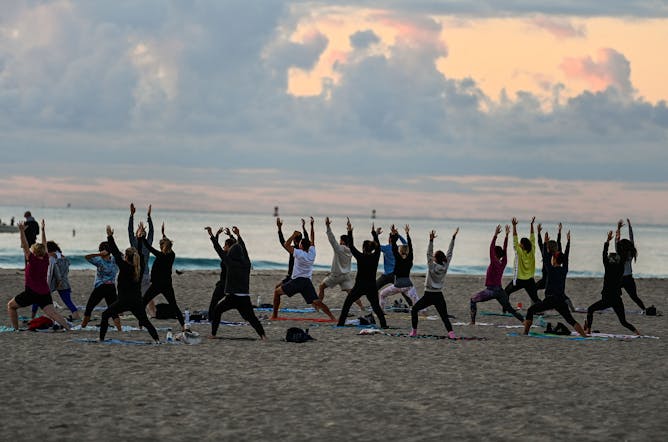|
Over the past few years, the number of Americans pursuing meditation and yoga as part of a spiritual practice, usually as an alternative to engaging with a formal religion, has risen sharply.
But is there a downside to this increase in alternative spirituality? According to some critics, focusing on practices that emphasize self-care, such as mindfulness, can keep people away from engaging with neighbors and religious congregations. Some say it may even decrease political engagement.
Sociologists Evan Stewart of UMass Boston and Jaime Kucinskas compared how spiritual and religious Americans vote, volunteer or get involved in their communities and came up with surprising findings on what being an “engaged citizen” means in the 21st century.
Also today:
|

For some, yoga is a spiritual practice that may substitute for religion.
CHANDAN KHANNA/AFP via Getty Images
Evan Stewart, UMass Boston; Jaime Kucinskas, Hamilton College
As the US gets less religious, some thinkers warn that it may get more selfish as people engage less with their communities. A team of scholars decided to investigate that concern.
|
Ethics + Religion
|
-
Greta Uehling, University of Michigan
An anthropologist explains how years of conflict have made Ukrainians reassess their priorities and relationships.
|
|
Environment + Energy
|
-
Tarun Gopalakrishnan, Tufts University
India’s international climate pledge could set the tone for other emerging economies for a decade.
|
|
Health + Medicine
|
-
Elaine Mormer, University of Pittsburgh Health Sciences; Lucas Berenbrok, University of Pittsburgh Health Sciences
OTC hearing aids promise to increase the accessibility and affordability of the devices for millions of adults who live with untreated mild to moderate hearing loss.
|
|
Economy + Business
|
-
Judith Keller, University of Heidelberg
The low-income homebuyers who obtained these homes were deprived of the financial security they were promised. They’re now eligible for at least $25,000 in reimbursements for repairs.
|
|
Science + Technology
|
-
Jason Bruck, Stephen F. Austin State University
Using urine and signature whistles from other dolphins, a team of scientists has shown that dolphins use signature whistles like names and hold mental representations of other dolphins in their minds.
-
Michelle L.D. Hanlon, University of Mississippi
The era of lunar resource use is quickly approaching. But with legal and practical issues still looming, nations are starting to think about sustainable ways to mine and protect the Moon.
|
|
Education
|
-
Nir Kshetri, University of North Carolina – Greensboro
Sitting in the front row of a lecture hall could become obsolete as more colleges and universities enter the metaverse.
|
|